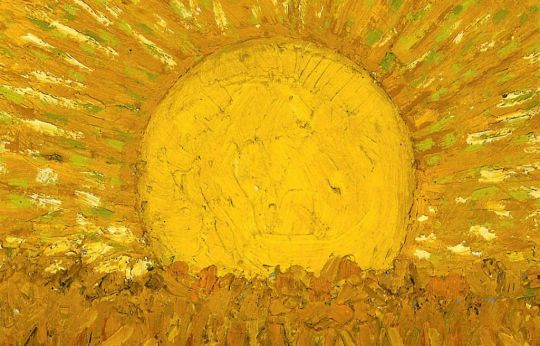Text
The light of his life

( I haven't tried to draw Helen before and I'm generally bad at drawing women. I'm trying though.)
69 notes
·
View notes
Text

Ivan Pokidyshev
The nostalgia of the infinite, 2024
Oil on canvas.
5K notes
·
View notes
Text
Poem: Victory on Behalf of an Accordion
Last night, standing outside a line of golden bulbs, Looking upwards into an untouchable space, The otherworldly stage where switches make inscrutable change, Determining by the amp, the pedals, the mics, whether music exists, At their mercy, we thought we heard the final notes fade. "Encore," we said, rising on our powerless feet. "Encore!" The accordion inflated its wild lung and continued to sing.
6 notes
·
View notes
Text
sunlight, sunlight, sunlight



SUMMARY: The day before Helen is expected to die. John grapples with grief and the torment of losing someone he cares.
grief/mourning, character study, handling grief
read on ao3 | inspired by sunlight | 456 wc

THE DAY BEFORE Helen is expected to die.
(God. Please don’t take her.)
Maybe John deserves nothing. Maybe he was put on this earth for the simple reason to suffer because why should he live perfectly? Why be given the pleasure of human life?
A day in the cold house, John is alone—so alone; he can feel each pulse of his heart thrum from within his rib cage. Helen is gone, but maybe, just maybe, she has a chance.
Helen has turned him optimistic. She is everything opposite to him, she is everything the Director condemned, she is sunlight, she is the sub, she is the soft breeze in the morning, she is the light bells of local cafe doors opening chiming, she is everything. She is brimming with life. She will be buried.
Sometimes, John silently prays.
(God, please don’t take her. Not her. Please. God, please, don’t take her from this earth, please, please, please just don’t take her. His wonders if his desperate pleas to God and heaven above are even taken into consideration. Or even heard. Or maybe God never really cared for him. Maybe God has abandoned him and he’s suffering because of it.)
How human it is to finally feel suffering. John sits at the edge of the bed, and there is already grief piling up in him. This is the world around him, so grey and unfortunate—dim and miserable. The sunlight outside doesn’t seem so bright anymore. The sun is gone.
What sin as he committed for God to take her but not him? John sits at the edge of the bed, wearing a mangled expression of grief and tragedy, and hope and wishing, and begging and pleading, and distraught and anger. Anger pointed to God. Anger pointed to himself.
His phone is in his hands, everything in life feels disgustingly hollow. There was a time in John’s life—Helen—where everything felt fulfilling. He watches the videos of her in his phone, journaling through pictures and videos because he never could quite write his conflicting thoughts into words. Helen could, she seemed to be so poetic, words so beautifully sounded and written it made her seem otherworldly.
“What are you doing, John?” Helen’s voice is soft with the sea gently running along the beach, sea foam touching the tips of both of their feet.
John wants to go back here.
“Looking at you.” John wants to look at her again, outside, not chained to a hospital bed. He had everything. He was close to it. He was so close to heaven and yet he fell, and he fell hard.
(God, do you hear me? God, please don’t take her so soon. What did I do for you to take her?)
Maybe this is why she taught pain so harshly.
38 notes
·
View notes
Text


a soul that’s born
in cold and rain
knows sunlight,
sunlight, sunlight
sunlight — hozier
39 notes
·
View notes
Text









musings on the sun
christina perneta, noor hindi, vincent van gogh, jeanette winterson, zinaida vysota docenko, anne sexton, olga kos, khalil gibran
27K notes
·
View notes
Text
𖤓 𝐎𝐫𝐢𝐠𝐢𝐧 𝐨𝐟 𝐭𝐡𝐞 𝐒𝐮𝐧 𖤓

Image Source
Summary: How did Helen become the kind of person who can accept a killer? How did her love become so unconditional? It wasn't as simple as you might expect. The path towards light was paved with darkness.
TW: Being orphaned. Brief mention of Helen's first kiss in middle school (do not make this sexy, she's a minor). Severe physical and emotional child abuse and neglect. Scapegoat abuse (abuse of one family member who is blamed for all problems in the family). Murder of a minor by a parent. Survivor's guilt. Self hatred. Dead Dove Do Not Eat.
Author's Note: This is the backstory that I envisioned for Helen while writing The Broken Veil. It's based on the fact that John never interacts with her family and they don't appear to be at her funeral, which leads me to believe that she is estranged from them. But, this is mostly invented from thin air - with some projecting and venting. I haven't been through anything as horrific as this, but I'll just say that I do relate to Helen's experience of family abuse in a certain way. My hope is that I've handled this very delicate topic with some grace, but please know that I am writing it from an emotional place and I am not a therapist or social worker.
──●𖤓●──
At the dawn of her life, there was love.
It was simple then. Pure. Unquestioned and easy to understand. Not only because the two figures always at her side were so unquestionably affectionate, but because loving came naturally to Helen herself. She was the baby who always laughed when her parents laughed, and smiled when they smiled. And they nearly always smiled, because they had Helen, and she had them.
Then they were gone.
──●𖤓●──
Love haunted the suburban McMansion at the outskirts of St. Louis, Missouri, with the white clapboard walls and yellow trim. It found its way between the thin curtains in Helen’s bedroom, where she caught it in her arms every morning and carried it downstairs to her sister, Bonnie, whose bedroom was windowless.
Bonnie was adopted a year after Helen, and she was two years younger. The Kennedys had a perfect family in mind: two daughters, and a son, all “rescued,” as evidence of their unimpeachable benevolence. But they were denied for a third child. One of Mr. Kennedy’s references advised against approval, and his response was so disorderly with outrage that the situation could not be salvaged. Although they tried again several times, they were never approved. Mr. Kennedy never found out who had thwarted him in obtaining a son, but Helen and Bonnie would be forever grateful to them.
It wasn’t that they wouldn’t have wanted a brother. On the contrary, another person in the house who was not either of their parents would have been a massive relief, and Helen begged for it at the time. But in retrospect, they could not wish that on anyone.
Helen, despite being older, didn’t understand at first. The Kennedys were sweet to her. Mrs. Kennedy told her that she was the most important thing in the world to them. Mr. Kennedy held her on his lap and told her about the nature of love. That love is a dance between merciful grace, and benevolent punishment. Love is about doing what is best for someone, always. And they would always do what was best for their children.
Bonnie was not typically punished in front of her, and she was such a boisterously happy child that she was able to hide her distress, both at school and from her sister. Her disposition matched Helen’s perfectly – playful, creative, giving, always eager to smooth over a social interaction. They did everything together. They played pretend on the “mountain” (the staircase leading up to the deck), went racing on their skateboards, searched for birds’ nests in every neighborhood tree and stared at them to try to catch one hatching. They laid on the lawn making flower crowns and talking about what they wanted to be when they grew up. Bonnie wanted to be a racecar driver and go far, far away. Helen wanted to be a veterinarian taking care of baby birds. But they would definitely go to the same college. They’d be together forever, because even though they weren’t born together, their hearts were made of the same substance.
The difference between them was that Bonnie was more secretive. She had to be.
But over time, the household became comfortable in its abuse. Bonnie was a trouble child, Mrs. Kennedy would explain. That was why they had to treat her this way. When the parents fought, it was somehow Bonnie’s fault. When things went wrong for them, it was because Bonnie was bringing them bad luck. Everything went wrong after she arrived. They should have adopted a little boy first instead, and now they’d never have one.
Bonnie and Helen would do the exact same thing, often together, and Bonnie would be punished, and Helen…wouldn’t. She couldn’t understand it. Soap in her mouth for talking back. No dinner for a week. One day, when Helen was nine, Mr. Kennedy sat down at Bonnie’s door with a screwdriver and started taking off the hinges. “She’s been keeping secrets from me,” he said. He’d found her diary. That evening, Mrs. Kennedy read it aloud in front of both children while Bonnie wept.
“Why do they love Helen and not me? Sometimes I hate her for it, but it’s not her fault. I know why. I try to be good but I’m a bad child.” That line would live in Helen’s memory forever. She rushed at Mr. Kennedy, not knowing what she intended to do. But the situation had become untenable. Why wasn’t Mrs. Kennedy upset about this? Why wasn’t Bonnie fighting back? Something had to be done, and nothing was being done.
But it backfired utterly. “Look what you have made your sister do,” he said to Bonnie, when Helen had spent her strength beating her little fists against his legs. And Helen watched, and learned where the bruises on her sister’s body came from, that she didn’t fall out of trees as often as she claimed. From that day, she ceased to call him her father. Mr. Kennedy was his name.
When it was over, Bonnie wasn’t allowed outside. So Helen made flower crowns alone and brought her one. “You can hate me if you want, Bonnie. I’ll love you anyway.”
“Throw it out,” she whispered. “They’ll think I snuck into the backyard if they see it.” But she held it for a moment first. “I don’t really hate you, Helen. I won’t, ever. I promise.”
──●𖤓●──
Helen soaked up love for one brilliant hour every day at Azalea Middle School’s lunchtime, her face turned upward and her heart temporarily at peace. She talked about love with her best friends. She kissed Susie Morgan, as practice for kissing boys. She kissed Robbie Clearwater, as the real deal, but it didn’t feel any more or less real if she had to be honest. It was all play acting. Real love was about doing something big for somebody, like rescuing them from a dragon or stabbing yourself like Juliet. Or staying with them after they stabbed somebody else.
Susie and Robbie were both “good kids.” Not trouble kids. Not like Bonnie and her friends. Bonnie had already given up on herself – if her parents thought she was trouble, then fine, she’d be trouble. She started hanging out with the bottom of the class, the ones who got in fights and skipped lessons. Helen decided that she would never be like Bonnie.
But it was the trouble kids that Helen really wanted to be around. Like Brandon “Blaze” Raoul, who smoked weed with the 9th graders from across the street. She heard he actually aced the math test in spite of everything, and decided he had a heart of gold. But she’d never admit it.
Bonnie dumped her lunch tray over Helen’s blouse while she was looking at him one day, and Helen chased her all the way across the playground. She didn’t stop until Helen yelled, “I’m telling Mr. Kennedy!” The hurt and fury etched into her face would remain etched in Helen’s mind from the rest of her life.
But it was Bonnie who told Mr. Kennedy that Helen liked a bad boy. Or rather, it was Bonnie who took all that practice stealing Marlboros from the gas station to steal a blunt out of Brandon’s bag and stick it in Helen’s, only to encourage her father to search their backpacks that night. She looked all too smug, watching Helen take the brunt of the punishment for once. And the Kennedys made the decision that both girls would be transferring schools.
“You know, you really are what they say,” she shouted at Bonnie through tears that night. “I hate you, I hate you, I hate you! You��re spiteful and ungrateful and you always mess things up for me! I wish you weren’t here!”
“I’ve hated you for years, Helen! My personal hell! I hope your perfect face gets smashed in! I hope Mr. Kennedy really does the shit he says he’ll do sometimes!”
──●𖤓●──
Helen couldn’t find love for a couple years at a stretch. Where had it gone? Was it hidden behind the clouds? It always seemed to be raining in Missouri. Was it buried inside her body? Her body seemed to physically ache. Sometimes she felt like she was dying.
The only way she expressed herself anymore was by taking pictures. She asked for a camera for her sixteenth birthday, and of course, she got it. And she took pictures of people, almost exclusively. She didn’t speak to Bonnie kindly, but she photographed her kindly. She chose those moments in which Bonnie looked almost the way she did years ago, before things got really bad.
Whose fault was it? She thought about that a lot, even before it happened. So much had already happened. More than enough. And there was a sense of something coming. Why did Bonnie have to ruin everything? Bonnie’s torment was always at the edges of her mind, spoiling every happy moment. And while that shouldn’t be about herself, Helen was tired. Tired of trying to be the high achiever to maintain her own tenuous hold on her parents’ mercy. Tired of protecting Bonnie, tired of fighting with her, tired of pitying her. Tired of wracking her brain about who she could tell and how she could get help for them without just making things worse. Tired of watching her be hurt and feeling that pain in her own heart. So she hardened her heart until it ached physically instead of emotionally. Let Bonnie deal with it on her own. She didn’t want Helen around anyway. Maybe she’d finally run away for good.
In the last few years of high school, Helen started having chest pain. Panic attacks, she would later learn. She felt like she was going to die. What was happening with Bonnie was going to kill her. And wrong as it may be, she hated Bonnie for that.
She had left for college when it happened. She got out the moment she could, as anyone might. Bonnie would be out soon enough too, she thought. There was nothing she could have done, no way she could have known. That’s what she told herself afterwards, and she never believed it.
The facts: Bonnie Kennedy tried to run away with a group of friends she met outside of school. With a gang. Mrs. Kennedy intercepted her and brought her home against her will, by binding her hands and feet with duct tape and forcing her into the back of the vehicle.
The facts: Mr. and Mrs. Kennedy had just had a fight the same week. Mrs. Kennedy was sleeping on the couch. They needed someone to take out their anger on.
The facts: On September 20th, while Helen Kennedy was in a chemistry lecture, Bonnie Kennedy was murdered by her father under her mother’s watch. The neighbors filed a noise complaint. Mr. and Mrs. Kennedy were apprehended and taken into police custody three days later.
──●𖤓●──
The ache of Helen’s love did not kill her. She lay on her dorm bed that night in the darkness, waiting for her heart to stop. It never did.
The only thing Mrs. Kennedy had to say was, “Don’t testify. Don’t do this to him. Are you really going to side against your own father?”
Helen scoffed. “Against him? What about you? Do you think you’re blameless?”
A long pause while they stared at each other through bulletproof glass. “No one is blameless here. But –“
“No. No one is blameless.”
She did not speak to Mr. Kennedy at all.
She spoke to the judge. She spoke for hours and hours in a cold sweat, in a trance, revealing everything. She spoke until she went hoarse. She spoke again when the trial dragged on into a second day. She spoke at the appeal. She spoke until she expected to be arrested herself because the fact that she had stood by through all of it, and hadn’t been there to save Bonnie, was a crime beyond all crimes. Why was no one dragging her away? Regardless, she kept speaking. She was saying, I love you, Bonnie. I love you, my sister.
──●𖤓●──
The ache of love didn’t kill Helen, but it chased her out of Missouri, all the way to the East Coast. When she put the pieces of herself back together and returned to college, it was at Georgetown, on a scholarship. Apparently, a sob story that had been on the news was good for admissions essays. Especially when it tied right into your major.
She studied to be a social worker. She screamed her love for Bonnie at the whole world. Bonnie, who was gone, and could not receive it. Helen opened herself and poured love. She cried with abuse survivors. She testified on their behalf. She watched them be saved. She watched the system fail them. She watched them become hateful. She watched them die. Over and over and over and over until her mind broke.
And she screamed her love for her parents. Yes, her love for her father. For her mother. For the woman who had treated love as the most important thing in the world – which is to say that she let her lover commit any crime. For the man who had sat her on his knee and told her lies about what love was, because he believed those lies and knew no better. She was finally old enough to understand what broken people they were, and yet her love for them had become forbidden. Unthinkable. Forgiveness would never be hers to extend. They had taken her right to love them when they committed such an act. Well, so be it. She would take the grief aching in her chest and throw it at the entire rest of the world instead. She would love EVERYONE.
She tried to be a “good” person, to love all survivors and hate all abusers. Except that the abusers were also survivors, and the survivors were also abusers. And she didn’t know which she was, but it seemed that she could only be both. Everyone hurt everyone else, it seemed. Everyone failed to protect each other. Did that not matter to anyone? Where was the sense of injustice? She came to hate EVERYONE.
For ten years, Helen served as a social worker with child protective services. Ten years screaming, until she finally burnt out.
She’d been to therapy before. But this was different. This was quitting her job to burn through her savings going to daily sessions because something had to give, and it was either going to be her way of life or her life itself.
They talked mostly about grief, which was to say that they talked mostly about love. Were her parents capable of love? Was she capable of love? Why had she and Bonnie turned on each other, and did it mean they didn’t really love each other? What did real love look like? They talked about that phrase, “love is a dance between merciful grace, and benevolent punishment.” How did one decide who to punish, and who deserved mercy? Who could be trusted with such a decision?
Maybe no one. Maybe the punishment part just had to go.
So she let herself be like Bonnie. She traveled up and down the coast, through Baltimore, through Philadelphia, always seeking out the underbelly, never into drugs but heavily into people. Hanging out with hippies and “free love” types. Cutting her hair short. Talking with runaways. Singing with strangers at midnight in a half dead karaoke bar. She wore leather jackets over soft white T-shirts. Never trying to look tough, never trying to look "cool", but demonstrating with her very body that she embraced them. That she wouldn’t jump down anyone’s throat for making a mistake or being themselves. What a “bad girl.” What a “troublemaker.” I’m sorry, Bonnie.
She fell in with genuine criminals too. It was odd, but she felt safe with them, in a way she had never felt safe with suburbanites who wanted perfection and punished anything less. There were some with their boot on the world’s throat, sure, but there were plenty more who had no choice. Who were running from something, or stuck in something, or just trying to survive. And all the judgement in Helen was used up on her parents. There was none left for the rest of the world. She just wanted to see people, know people. The camera came out again. Taking pictures of survivors, people who had suffered so much and caused so much suffering. People who believed they held no capacity for love. She showed them their own bodies, the vessels of that love where it still lay dormant.
──●𖤓●──
Love poured down from an infinite, flaming source, to wash over every human being and flow, finally, into the lens. Seeking an object, any object, whoever needed it the most. Over and over and over again, unquestioningly, unconditionally, until Helen began to heal. She felt poised for something, waiting for someone to receive her outpouring. It was then that the second phase of Helen’s life began. It was then that the sun broke through.
17 notes
·
View notes
Note
thoughts on helen wick and her backstory pre-marriage? 👀 (i have no clue how to interact to other people in english shshsbhdsj)
Evvvren!! I love this question. I'm sorry it's taken me a while to answer, I've been thinking about it.
I guess we know from the Wiki that she was a photographer? And I recall from the letter scene that there were artsy coffee table books stacked up, I think there was one on Alvaro Siza, he does very modern, boxy buildings (kind of like John Wick's house) -- I have come to headcanon now that it was Helen who was into that modern aesthetic. (I can't shake the feeling that it doesn't really suit John Wick. He likes classic muscle cars and Victorian children's books. Left to his own devices, I think he probably likes a bit more ornamentation, but it's easy to imagine him going along with anything Helen wanted when they were starting their married life together. 😭)
Something that slays me about Helen is that she seems kind of basic? And I don't mean that in a bad way! It's a adorable. The whole daisy fixation is just ridiculously cute, it's such a happy hippy flower child choice. And like, she's obviously SMOKING hot, yet in that dinner scene with John she's wearing that almost dowdy soft pink shirt with the long-short sleeves.

Look at these idiots in love...
It makes me think that she was so cool and comfortable with herself she didn't care. Zero fucks given. Like that woman must have had Personality. I think she was just a really bright light. Full of love. Strong. And she TEASED John Wick like no one else ever had. You can totally see it in the car scene at the beach, when they're holding hands over the roof of the car. And she's all "What are you doing, John?" in That Tone, LOL, I think she was good at getting John out of his shell and not taking things so seriously. I'm sure she knew he'd Seen Some Shit™ and made it her mission to help him let it go and live a happy life in his retirement.

I realize you asked about pre-marriage Helen. I'm guessing she was in the art scene in some capacity. I think she was cool, and not overly pretentious like so many artists are (can you tell I went to art school? LOL I can't staaaand that shit). I think she liked what she liked and didn't apologize for it, whether it was hippy dippy daisies, or an ex-mafia hitman named John Wick. 🌼🌼🌼
43 notes
·
View notes
Text
come lay with me so i can give you soft kisses
6K notes
·
View notes
Note
May we get another drawing of Mrs.Helen Wick? like just Helen? I absolutely love the way you draw her :’)

Her 🌼
290 notes
·
View notes
Text
Just curious, what are your headcanons about what song/band John listens to ?
I remember there being a post about this somewhere… :0

20 notes
·
View notes
Text

Iris (detail) by John Atkinson Grimshaw (1886)
9K notes
·
View notes
Text

Midsummer Night or Iris (John Atkinson Grimshaw, 1876)
8K notes
·
View notes
Text


I bought my first kindle & I’m already obsessed! I filmed a little vlog where I decorate it with diy stickers, you can watch it here 📖✨
1K notes
·
View notes











